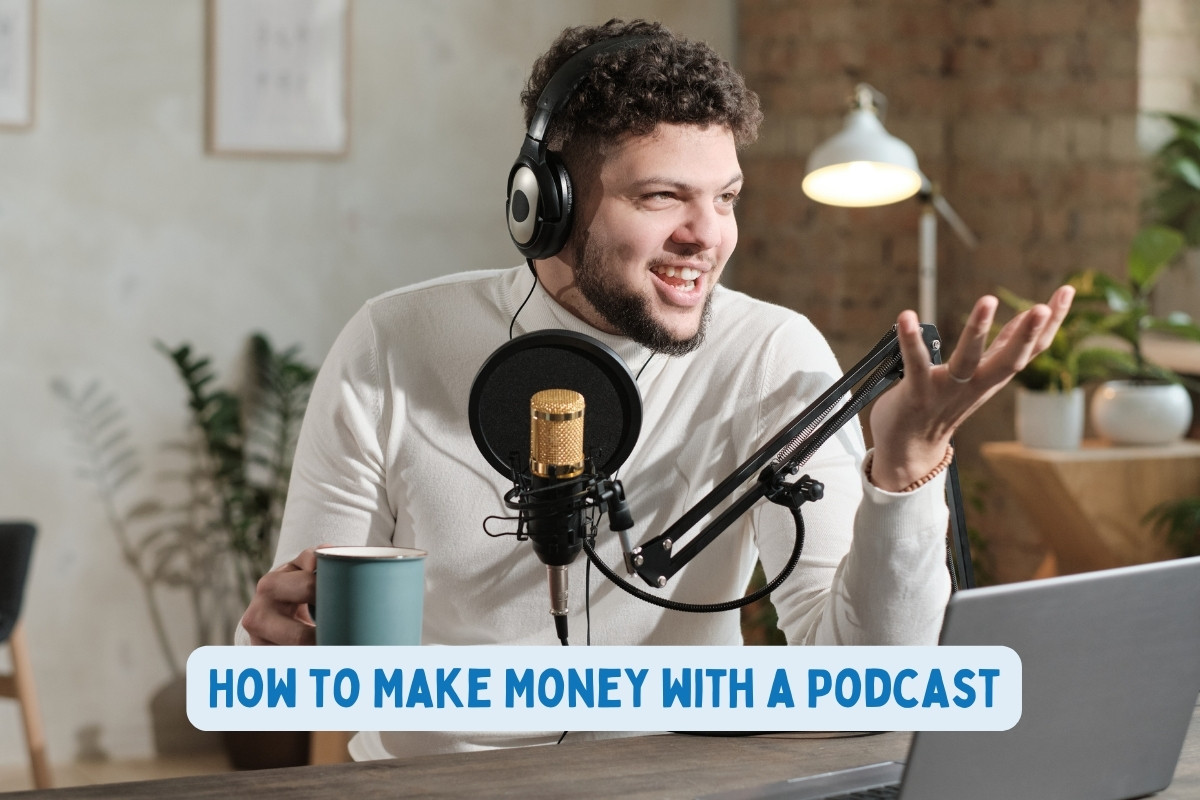Podcasting has become a popular medium for content creators to share their voice, stories, and expertise with the world.
With the rise of podcasting, many have found it to be not just a platform for expression, but also a potential source of income.
Whether you are a seasoned podcaster or just starting out, there are various ways to monetize your podcast and turn your passion into profit by learning the different techniques of how to make money with a podcast.
In this guide, we will explore different strategies and tips on how to make money with a podcast for beginners.
Post Contents
- 1 How to Make Money with a Podcast for Beginners – 12 Ways to Do It
- 1.1 1. Sponsorships
- 1.2 2. Listener Donations and Crowdfunding
- 1.3 3. Premium Content and Subscriptions
- 1.4 4. Live Shows and Events
- 1.5 5. Online Courses and Workshops
- 1.6 6. Consulting and Coaching Services
- 1.7 7. Selling Merchandise
- 1.8 8. Affiliate Marketing
- 1.9 9. Book Deals and Publishing
- 1.10 10. Licensing and Syndication
- 1.11 11. Virtual Events and Webinars
- 1.12 12. Advertising Networks
- 2 Tips for Monetizing Your Podcast
- 3 FAQs
- 4 Conclusion
How to Make Money with a Podcast for Beginners – 12 Ways to Do It

From finding your niche and building an audience, to leveraging different revenue streams such as sponsorships, merchandise, and listener donations, we will guide you through the steps to make your podcast financially successful.
So, if you are ready to take your podcast to the next level and start earning from your audio content, keep reading to discover the keys to podcast monetization.
1. Sponsorships
Sponsorships are one of the most common and lucrative ways to monetize a podcast.
Brands pay to have their products or services mentioned during a podcast episode, usually at the beginning, middle, or end.
The cost of sponsorships can vary widely, depending on the size and engagement level of the podcast’s audience.
It’s important for podcasters to find sponsors that align with their content and audience to maintain authenticity.
Utilizing platforms like Podcorn can help podcasters connect with potential sponsors.
2. Listener Donations and Crowdfunding
Podcasters can ask their listeners to support the show directly through donations or crowdfunding platforms like Patreon.
This method allows loyal listeners to contribute financially, often in exchange for exclusive content or perks.
It’s a great way to build a community around the podcast and keep the content listener-focused.
However, it requires a strong and engaged audience willing to contribute.
3. Premium Content and Subscriptions
Offering premium content or subscriptions is a direct way to monetize the audience.
Podcasters can provide additional content, ad-free episodes, or early access to regular episodes for a subscription fee.
Platforms like Patreon or Supercast make it easy to set up and manage premium content offerings.
This method requires consistently delivering value to justify the subscription cost.
4. Live Shows and Events
Podcasting can transcend the digital space through live shows and events, providing a unique experience for the audience and a lucrative opportunity for the host.
By selling tickets, securing event sponsorships, and offering exclusive merchandise, podcasters can significantly boost their revenue.
Live events also offer a platform for networking, potentially leading to more sponsorship deals and collaborations.
However, organizing such events requires careful planning, resources, and a dedicated fan base willing to participate.
Despite the challenges, the potential for community building and increased revenue make live events an attractive option for podcasters.
5. Online Courses and Workshops

Podcasters can monetize their expertise by creating and selling online courses or workshops related to their podcast content.
This not only provides an additional revenue stream but also enhances their credibility and authority in their niche.
Platforms like Thinkific and Teachable offer user-friendly solutions for hosting and selling educational content.
It’s important for podcasters to ensure that their courses provide valuable and unique insights that align with their audience’s interests and needs.
This method of monetization works best for podcasters who have established themselves as experts in their field.
6. Consulting and Coaching Services
Leveraging the trust and authority built through their podcast, hosts can offer personalized consulting or coaching services.
This is especially viable in niche markets where the podcaster has significant expertise.
These services can range from personal coaching sessions to consulting for businesses and organizations.
Pricing should reflect the value provided and the podcaster’s level of expertise.
This monetization strategy not only generates income but also strengthens the podcaster’s position as an authority in their field.
7. Selling Merchandise
Podcasters can create and sell branded merchandise, such as apparel, accessories, or digital products.
This not only serves as a revenue stream but also helps in building and promoting the podcast’s brand.
It’s crucial to offer quality products and designs that resonate with the audience.
Platforms like Merch by Amazon or Teespring can facilitate the production and distribution of merchandise.
This strategy works best when the podcast has a dedicated and engaged audience.
8. Affiliate Marketing
Affiliate marketing involves promoting products or services and earning a commission for sales made through affiliate links.
Podcasters can seamlessly integrate product recommendations into their content, ensuring relevance to the audience.
It’s important to maintain transparency and disclose affiliate relationships to maintain trust with the audience.
This monetization strategy requires a balance between promotion and content quality to be effective.
Choosing the right affiliate partners that align with the podcast’s values and audience is crucial.
9. Book Deals and Publishing

Podcasters with a strong voice and unique content may attract book deals or opportunities to publish their work.
This not only provides an additional income stream but also enhances their credibility and reach.
Writing a book requires significant time and effort, but it can be a rewarding endeavor.
Self-publishing is also an option, with platforms like Amazon Kindle Direct Publishing offering a way to reach a wide audience.
This strategy is most suitable for podcasters with a compelling story to tell or valuable expertise to share.
10. Licensing and Syndication
Podcasters can license their content to other media outlets or platforms, providing a new revenue stream.
This involves allowing others to use and distribute the podcast content, usually for a fee.
It’s important to negotiate fair terms and ensure that the licensing agreement aligns with the podcaster’s goals and values.
This strategy can increase the podcast’s reach and visibility while generating income.
However, it requires a high-quality and unique podcast to attract licensing or syndication deals.
11. Virtual Events and Webinars
In addition to live events, podcasters can host virtual events or webinars, tapping into a global audience.
This can include live podcast recordings, Q&A sessions, or educational webinars.
Ticket sales, sponsorships, and exclusive content can generate revenue.
Virtual events also offer the convenience of participation from anywhere, potentially attracting a larger audience.
This strategy requires careful planning and promotion to ensure a successful and profitable event.
12. Advertising Networks

Joining an advertising network can streamline the process of finding and managing sponsorships for a podcast.
Networks connect podcasters with potential advertisers, matching them based on content and audience demographics.
This can save time and ensure a steady stream of advertising revenue.
However, the network will take a percentage of the earnings as commission.
It’s important for podcasters to choose a reputable network and ensure that the advertisements align with their content and audience.
Tips for Monetizing Your Podcast
Choose the Right Monetization Strategy
It’s crucial to select a monetization strategy that aligns with your podcast’s niche, audience size, and engagement level.
Diversifying your income streams can also help stabilize your revenue.
Build and Engage Your Audience
Focus on consistently delivering high-quality content and engaging with your audience through social media, email newsletters, and live events.
A strong, engaged audience is more attractive to sponsors and more likely to support your monetization efforts.
Be Transparent with Your Audience
If you’re using affiliate marketing or sponsored content, always disclose this to your audience.
Transparency builds trust, and trust is essential for any successful monetization strategy.
Offer Value to Your Sponsors and Advertisers
Ensure that your podcast provides a valuable platform for sponsors and advertisers.
This means having a clear understanding of your audience demographics and being able to communicate this to potential sponsors.
Keep Improving Your Content
The quality of your content is fundamental.
Continuously work on improving your podcast, seeking feedback from your audience, and staying updated with industry trends.
FAQs
How Do I Find Sponsors for My Podcast?
Look for companies that align with your podcast’s niche and values.
You can reach out to them directly, join podcast advertising networks, or use platforms like Podcorn to connect with potential sponsors.
Can I Monetize My Podcast from the Beginning?
Yes, but it might be challenging.
Focus on building your audience and improving your content first.
As your audience grows, more monetization opportunities will become available.
How Much Can I Earn from Podcasting?
It varies widely.
Income from podcasting can range from a few dollars to thousands per month, depending on your audience size, engagement level, and monetization strategies.
Is It Necessary to Have a Large Audience to Monetize My Podcast?
Not necessarily.
While a larger audience can provide more opportunities for monetization, a smaller, highly engaged and niche audience can also be attractive to certain sponsors and advertisers.
How Do I Set Pricing for Sponsorships and Advertisements?
Consider your audience size, engagement level, and the industry standard.
You can also look at what similar podcasts are charging.
Be transparent and realistic with potential sponsors about what you can offer.
Conclusion
Monetizing a podcast requires a combination of creativity, strategic planning, and a deep understanding of the audience.
By diversifying revenue streams and remaining authentic to their content and listeners, podcasters can turn their passion into a profitable venture.
Whether it’s through sponsorships, merchandise sales, or offering exclusive content, the opportunities are vast.
The key is to stay true to the podcast’s vision, consistently deliver value to the audience, and be open to exploring various monetization strategies.
With dedication and the right approach, you can learn how to make money with a podcast and see how it can indeed be a rewarding and financially sustainable endeavor.






























